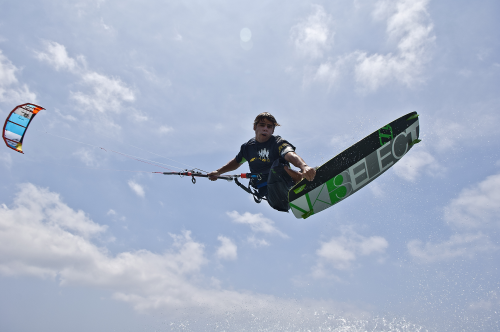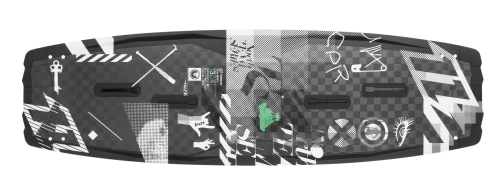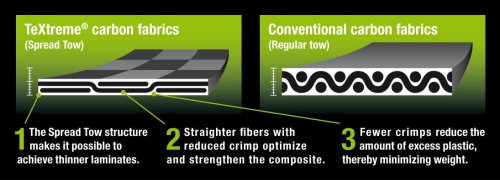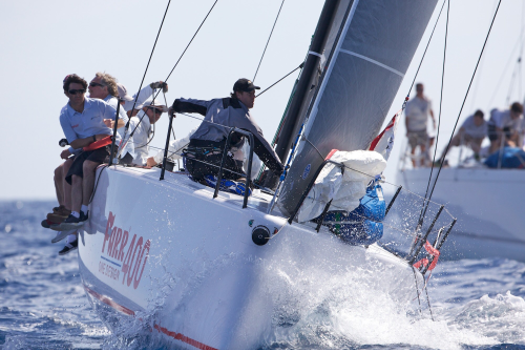


When developing a high-performance kiteboard, the technical demands are quite challenging. Not only do you want a board that is extremely stiff, but you also want a board that is highly flexible in other ways. The final objective is always to ensure the ultimate ride for the user.
From a manufacturing perspective, achieving the ideal balance between stiffness and flexibility lies in constructing a board that while being very responsive still retains control in all kinds of waters. This requirement places strong demands on the carbon reinforcement used in the board manufacture as it must ensure that different levels of stiffness are provided in different directions.
Optimised reinforcement
North Kiteboarding, led by Product Engineer Jürgen May, focused the development of its new Select and Team Series boards on further optimising the carbon reinforcement used. The decision was made to use TeXtreme spread tow carbon fabric to achieve weight savings and the mechanical performance that is required in all of the board’s directions. Oxeon provided its input into materials selection and the best solution proved to be an unbalanced 140 g/m2 TeXtreme fabric, which ensures extreme stiffness in one direction.
“Based on the strength and stiffness requirements provided by North Kiteboarding we were able to suggest several unbalanced TeXtreme spread tow fabric variants with different fibre types, areal weights and balance ratios,” explains Fredrik Ohlsson, Product Manager Materials at Oxeon. “Following a selection process North Kiteboarding decided that a 140 g/m2 high strength fabric with 5/7 of the fibres in the 0-direction suited their needs best.”
Manufacture
North Kiteboarding manufactures around 850 Select boards and 800 Team Series boards a year. The construction of the company's boards depends on the board design and use but in general it follows a similar process.
The designer creates the board design using a 3D computer program. He then builds protoypes on a CNC machine and the prototypes are laminated as close as possible to the original lay-up specification. After selecting the right shape, the 3D data is sent to the production facility, where they build the mould which will be used in mass production. 'Approval boards' are then manufactured to check that the shape and lay-up is correct. The approval boards are measured and tested in practice on the water. After approval, the board production will start.
The boards are manufactured in a hand lay-up process using epoxy resin.
Ride experience
The choice of TeXtreme reinforcement for the new Select and Team Series boards has proven to improve the riding experience.
“The materials that make a board always dictate how it feels on the water and I think that the new TeXtreme materials really allows North to get the most from construction," says Tom Court, a North Kiteboarding team rider. "Each board is super light and easy to ride. With the flexibility allowed by the construction, each board is a smooth and comfortable ride no matter how you are using it.”
“The biggest difference between the Select/Team Series and other boards on the market is the weight," he continues. "They are probably some of the lightest and strongest boards out there. Using the snowboard construction alongside the Textreme carbon laminate makes for the best of both worlds.”
“The unique structure of TeXtreme and the performance benefits that it delivers are more or less impossible to find in other carbon fabrics," concludes May. "By having a fabric that is tailor-made for the Select and Team Series boards we obtained the best possible material that meets our requirements for taking this board to the next level.”
The Select and Team Series boards were launched during the summer of 2011 in several different models. ♦
TeXtreme is a high-performance spread tow fabric that is used to the reduce weight of composite products. The material utilises two proprietary technologies – spread tow and tape weaving. First, the carbon fibre is spread into thin flat tapes (spread tow) which are then woven (tape weaving) into a fabric. As the fibres are oriented relatively straighter and the fabric structure consumes less resin than a conventional regular tow fabric (which in turn reduces matrix dead weight), the combination of these technologies results in improved mechanical performance, superior surface finish and significant weight savings in the finished composite product. Oxeon’s spread tow and tape weaving technologies make it possible to use large tows* (12k and more) to produce ultra lightweight high performance composite reinforcements which could previously only be produced from 1k, 3k or 6k tows. For carbon fibre producers, the widespread adoption of spread tow fabrics would mean that, instead of having producing a variety of products in the 1-6k range, they could focus on fewer tow counts, e.g. 12k and 24k. *In the composites industry a tow refers to a bundle of continuous filaments (usually carbon fibre). Tows are designated by the number of fibres they contain, typically using a number followed by k to indicate multiplication by 1000. For example, 12k tow has 12 000 filaments. |
This article was published in the November/December 2011 issue of Reinforced Plastics magazine. To appy to receive your copy of the magazine please complete the subscription form.





